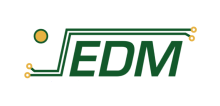36th EDM Workshop: Digitalization in electronics' design, supply chain and life cycle management
Electronics provides the engine for the digitalization of our economy and society. Electronics is everywhere and needs to fulfill an increasingly long list of requirements such as performance, low cost, quality, reliability, maintainability, sustainability, safety, regulatory compliancy, and many more. Deployment in new types of operational environments, new operation modes, new device technologies, and new applications, in combination with a very challenging supply chain and a continuously shortening time-to-market, makes the classic experience based design-build-test approach to product development obsolete. A paradigm shift is needed in which computational methods predicting the characteristics of electronics become a core element of design verification and validation. In this workshop we explore the industrial availability of tools that can support this paradigm shift as well those that can support the management of the electronic product's supply chain and life cycle.
12:30 Sandwich Lunch (optional)
Plenary sessions
13:30 Welcome
13:40 A paradigm shift in electronic product development (Geert Willems, imec)
14:00 Digitalization in the electronics industry (Jeroen De Jong, Siemens)
With increasing complexity and fast-changing business models, digitalization becomes more and more important to stay in the game, win new business and quickly adapt to changes. The old trial-and-error build-design-test is being replaced by solutions that maximally predict the life-cycle aspects and characteristics of electronics by means of simulations, virtual prototyping, design rule checks, supply chain assessment, etc. We also touch upon the role AI can play in digitalization in the electronics industry.
14:25 Smart manufacturing for electronics (Jean-Paul Dirven, Siemens)
How do you keep up with today’s component supply issues while balancing staffing and resources and still deliver quality products on time without passing the cost onto your customers? The answer is to make your factory "smart," making it operate as efficiently as possible with leaner operations for more effective use of your resources and more predictable inventory needs. You’ll gain maximum flexibility, better predictability, and more agility to lower lead times and costs for customers. Ensure on-time delivery with production capacity improvements and fewer defective products.
15:00 Break
Break-out session I: Design
15:10 Analysis driven design for electronics Part I (Julian Lai and Heiko Dudek, Siemens)
15:50 Analysis driven design for electronics Part II (Julian Lai and Heiko Dudek, Siemens)
Analysis is key to rapid evaluation and verification, allowing you to eliminate unfit designs as early as possible before consuming significant resources. Continuously verify, manage and share all the data, including requirements, test plans, and results, to address electronics design challenges and effectively shorten your entire program with Analysis Driven Design.
Break-out session II: PLCM
15:10 Supply Chain management (Andres Maya, Siemens)
In the rapidly evolving electronics industry, managing the supply chain has become increasingly complex due to technological advancements, fluctuating demand, and global disruptions. We address these challenges by focusing on the innovative concept of 'shifting left' in supply chain management. This approach emphasizes the importance of integrating supply chain considerations early in the product design and development phases to enhance resilience, efficiency, and innovation.
15:50 PLC management for electronics (Jeroen De Jong, Siemens)
Developing ever more innovative products requires a collaborative way of working that helps managing complexity and shortens development cycles. Teams should be enabled to collaborate as early as possible and in real-time, creating a 360º view of project, product, and process data. PLM provides the backbone for connecting data, applications, people and processes throughout a product's entire lifecycle.
16:30 Q&A – Networking-drink
Registration is closed. We are fully booked.
Participation is free of charge, but registration is required.


